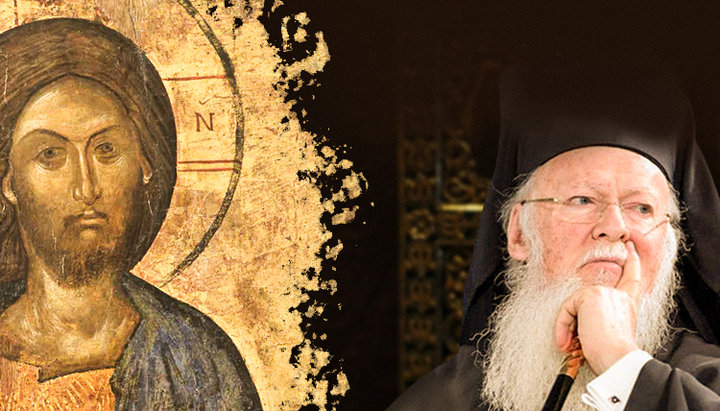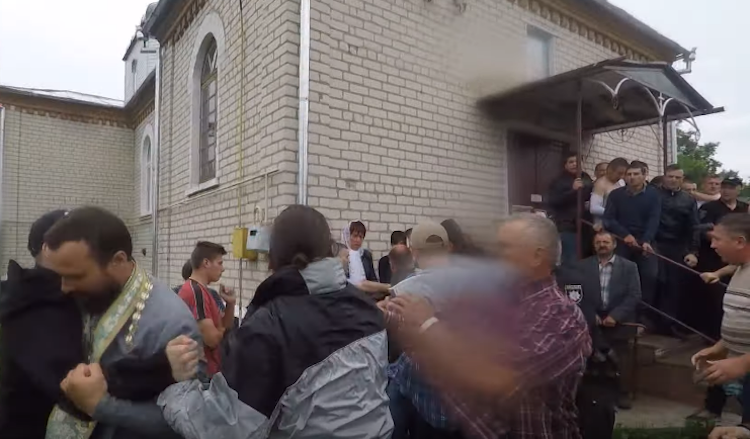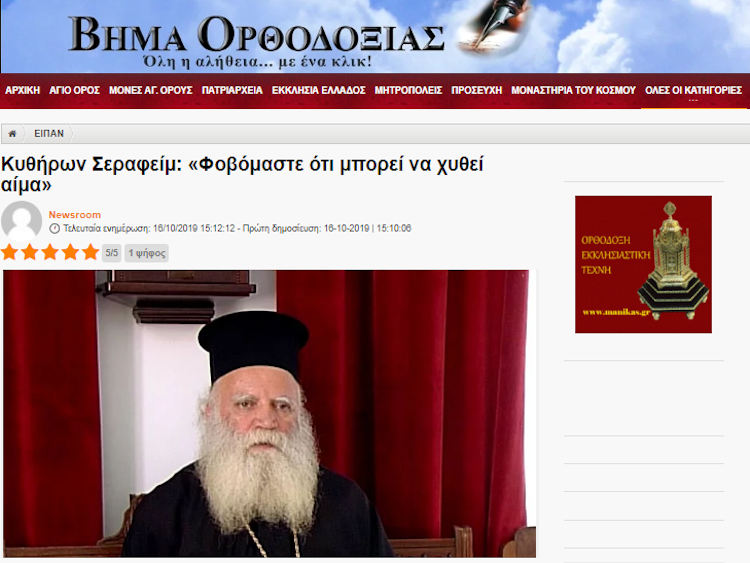Division from Christ and from Constantinople Patriarchate

What division the Savior spoke of and how it differs from the strife that the Phanar sows in the Orthodox world.
“Do you think I came to bring peace on earth? No, I tell you, but division. From now on there will be five in one family divided against each other, three against two and two against three. They will be divided, father against son and son against father, mother against daughter and daughter against mother, mother-in-law against daughter-in-law and daughter-in-law against mother-in-law.”
(Luke 12, 51-53).
Looking at today's actions of the Phanar, the way it builds relations with the Local Orthodox Churches, what church policy it conducts, and most importantly, what results it entails, one cannot but get the impression that it is Patriarch Bartholomew who opens his mouth and says: “Do you think I came to bring peace on earth? No, I tell you, but division. ...”
We read these words in the Gospel. Perhaps, Constantinople exactly fulfills what our Lord Jesus Christ said? Let's see how it happens.
The pretext for the Phanar’s interference in church affairs in Ukraine was allegedly the desire to unite various Ukrainian Orthodox faiths. In November 2018, Patriarch Bartholomew declared: “It is unacceptable that the Ecumenical See – which, according to the holy canons, is responsible for the unity and stability of Orthodoxy – would remain indifferent when Orthodox people, such as the Ukrainian people, suffer and seek solutions to church problems, tormenting them for centuries. <...> We intervene because it is our duty. <...> Therefore, just as we granted autocephaly to all Local Churches, the Holy Synod decided to grant autocephaly to the long-suffering Orthodox Church in Ukraine so that it would join the fullness of Orthodoxy in unity and inner peace.”
But in fact, the exact opposite happened. Even the Ukrainian Orthodox Church of the Kiev Patriarchate and the Ukrainian Autocephalous Orthodox Church could not really unite. On December 15, 2018, they held the so-called “Unification Council” with so many violations of Ukrainian law (not to mention church canons) that soon one should expect the recognition of this Council as invalid in court.
The leader of the UOC-KP Filaret Denisenko scandalously left the newly created Orthodox Church of Ukraine and is engaged in restoring the structures of the Kiev Patriarchate.
The Ukrainian Orthodox Church, which initially refused to participate in this political action under the patronage of Petro Poroshenko, was persecuted by officials and national radicals. What peace Patriarch Bartholomew and his Tomos brought to Ukraine is best evidenced by the parishioners of seized churches.
“When the Tomos was brought, this began ... The authorities actively intervened. <...> Supporters of the OCU entered the temple. They were accompanied by unknown people in camouflage, black tracksuits, and balaclavas. They forced their way into the territory and began to cut down locks.” (Archpriest Vladimir Gnys, the Holy Apostles Peter and Paul Church in the village of Malinsk, Rovno region)
“Events in our village began to develop with the adoption of the so-called Tomos, which was brought to Ukraine from Istanbul. <...> Then there were threats against me, my family. <...> We were forcibly evicted from the house where we lived and were registered. The situation further escalated, and on April 3 I received a call that people must come to the church and seize it.” (Archpriest Alexander Malchuk, the Holy Apostles Peter and Paul Church in the village of Postoinoye, Rovo region)
“Until that time (before the Tomos of the OCU – Ed.), the village lived its own life. The church stood prayed, everyone used to go to one temple. And on one day <...> the village was split up, I can’t even tell you how hostile the villagers are. There is really a civil war.” (Tatyana Androshchuk, a parishioner of the Holy Archangel Michael Church in the village of Polesskoye, Rovno region)

Truly, Patriarch Bartholomew brought to Ukraine “not peace but a sword”.
After the decisions of Constantinople in Ukraine, when the Phanariots cancelled the transfer of the Kiev Metropolis of 1686 to Moscow and declared themselves masters of all Ukrainian Orthodox faiths of 2018, and simultaneously “reunited” with the Church of Filaret Denisenko and Makariy Maletich with all their followers, the Russian Orthodox Church broke the Eucharistic communion with the Phanar. Thus, A real split began in the world Orthodoxy. But before these controversial, to say the least, and actually non-canonical decisions of the Phanar, all the Local Orthodox Churches lived in peace and unity.
Now, under the explicit pressure of the Fanar, the Church of Greece recognized the OCU. It is clear the schism in Orthodoxy only deepened, and its healing became even more difficult and long-term.
But the process of division began in the Church of Greece itself. Several influential Greek hierarchs after the Bishops’ Council, at which the OCU was recognized, spoke out sharply against that decision, and Metropolitan Seraphim of Kythira generally stated that there was no such decision, since there was no vote by the members of the Council. The hierarch described in detail how the session of the Bishops' Council of the Church of Greece took place, and also unambiguously expressed his position:
“The Ecumenical Patriarch completely unreasonably described the canonical Metropolitan Onuphry of Kiev and All Ukraine as the “non-canonical” Primate. The same applies to the arbitrary, without observing the necessary conditions (public repentance and renunciation of schism), justification and reinstatement of the deposed and anathematized schismatics, non-ordained and self-ordained 'clergy', including Mr. Epiphany who has no apostolic ordination since he was 'consecrated' by the excommunicated and anathematized schismatic, the false patriarch of the so-called Kiev Patriarchate Filaret. <...>
Unfortunately, the public received inaccurate news and information that only seven metropolitans did not agree with the recognition of the new ‘autocephaly’, while all the others supported it. This is a big mistake and I want to believe that it was not purposeful but because of an oversight. Because most of those present did not speak up, however, this does not mean that they support the new ‘autocephaly’. <…>
I would just like to end with my heartfelt humble address to His Most Holy Ecumenical Patriarch Bartholomew and His Beatitude Archbishop Ieronymos of Athens and All Greece with a request not to anticipate and compress things in a present critical state of the Church and not to proceed to the joint bishops' services with the so-called 'primate' of the new 'autocephaly' until a pan-Orthodox discussion of this complex and even explosive canonical and ecclesiological problem takes place.”
A real split began in the world Orthodoxy. But before these controversial decisions of the Phanar, all the Local Orthodox Churches lived in peace and unity.
The reaction to the appeal showed that in the Greek Church there really is a division, provoked by the Phanar pushing the recognition of the OCU.
Metropolitan Seraphim of Piraeus expressed deep gratitude to Metropolitan of Kythira and all the bishops who refused to recognize the autocephaly of the OCU and called the "hierarchs" of the OCU deposed, anathematized and non-ordained schismatics:
“I feel the moral obligation publicly to express my immense gratitude to the Metropolitan of Kythira and Antikythera, Seraphim for his overwhelming, profound and precise testimony of the events that took place during the extraordinary convocation of the Church of Greece. <…> I express my gratitude to the Holy God for the direct justification of all members of the Church Body who, following the sacred canons of our immaculate faith, refuse the illegal autocephaly of the Ukrainian schismatics, deposed, anathematized and non-ordained, which allegedly 'granted!!!' 'Metropolitan of Kiev' Epiphany."
The Holy Synod of the Church of Greece in response stated that the decisions of the Bishops’ Council are final and not subject to any interpretation other than the recognition of the OCU.
A few days later, Metropolitan Seraphim of Kythira declared that if the Primate of the Greek Church commemorates Epiphany Dumenko on October 19, "blood may be shed". This is the title of the article in the Greek edition “Vima Orthodoxias”.

“We are afraid that everything is becoming more aggravated, and I hope we will not get to this. If this continues, then in a few days, when they will have a service in Thessaloniki, if they commemorate Epiphany, I am afraid that it will be worse. Do not shed blood. There are people who are upset and concerned about the ongoing events,” said Bishop Seraphim.
An analytical article following the results of the Bishops’ Council of the Church of Greece published by the same resource says: “The decision will affect the situation inside the Church. Many clergy and laity who know about the Ukrainian issue and support the canonicity of Orthodoxy raise the question of conscience. <...> The situation may go to a split within the Church of Greece if the Church of Russia ceases communion with it, as it did with the Ecumenical Patriarchate. If this happens, it will be worse than the problem of the old-timers, which is still tormenting the Church of Greece.”
Time will show how far disagreements will go among the Greek hierarchs. But we can already say that the Patriarchate of Constantinople caused divisions where they hadn’t not been before.
A similar situation occurs on Mount Athos. The hegumen of the Xenophontos Monastery Fr. Alexy took part in the "intronization" of Epiphany in Kiev. Representatives of the OCU have been received and concelebrated with by the Xenophontos, New Esphigmenou, Dionysiou and Vatopedi monasteries. But most of the Athos monasteries close the gates to the schismatics, and some speak of the newly created church structure and the Phanar’s actions rather sharply and categorically. These are such monasteries as Agiou Panteleimonos, Hilandariou, Karakallou, Filotheou, Esphigmenou, Agiou Pavlou, Docheiariou, Osiou Grigoriou, Zografou monasteries, as well as a whole series of sketes and cells, many of which are even more famous and numerous than monasteries: St. Andrew’s skete, the Burazeri cell, the Panaguda cell, the Annunciation cell, St. John the Forerunner cell, the St. George cell, the Church of Protaton, the Theotokos skete of Xylurgu, whose hegumen Fr. Cyrion explicitly stated that Patriarch Bartholomew had torn the unity of the Church.
In April 2019, the abbots and confessors of the above-mentioned cloisters wrote an open letter in which they warned of the global threat of a split for the whole of Orthodoxy due to the Phanar’s decisions:
“With great sorrow and concern, we learn about what is happening in the Orthodox Church as a whole due to the non-canonical granting of autocephaly to the schismatics of Ukraine without the consent of the canonical autonomous Church, led by Metropolitan Onuphry. <...> There is a threat of the expansion and spread of the schism on a scale similar to the schism of 1054. <...> We are facing new wounds on the body of the Church, the exclusive responsibility for which lies with the Ecumenical Patriarchate."
The Patriarchate of Constantinople caused divisions where they hadn’t not been before.
Indicative in this respect is the situation in the Vatopedi Monastery. In February 2019, after this monastery received the OCU “bishop” Pavel Yuristy, the seven monks left the monastery and St. Panteleimon Monastery in protest. Vatopedi accepts schismatics, while the St. Andrew skete belonging to it is strongly opposed. Elder Ephraim, the hegumen of the skete, says that the Ukrainian schismatics should be treated in the same way as the Catholics.
Division again.
You can recall how the Phanar’s actions divided the united Church in Estonia, how the Patriarchate of Constantinople supported the “Renovationists” after the 1917 Revolution and other similar facts. The fact that the Phanar’s actions lead to division and confrontation appears apparent.
Now let’s see how the words of Christ “Do you think I came to bring peace on earth? No, I tell you, but division” are related to the actions of the Patriarchate of Constantinople.
In order to understand the basis for the division that God commanded, one must read a passage parallel to this passage in the Gospel of Matthew: “Whosoever, therefore, shall confess me before men, him will I confess also before my Father which is in heaven. But whosoever shall deny me before men, him will I also deny before my Father which is in heaven. Think not that I am come to send peace on earth: I came not to send peace, but a sword. For I am come to set a man at variance against his father, and the daughter against her mother, and the daughter in law against her mother in law.” (Matt. 10, 32-35).
From this, we learn that the criterion for division should be the confession of Christ, faith in him as God incarnated, as Truth, as the Saviour of the world. This is precisely what the Holy Fathers of the Church and the ancient interpreters of the Gospel meant.
Saint John Chrysostom:
“Unanimity is not always good: and robbers may agree. So, the quarrel was not the result of Christ's definition, but a matter of the will of the people themselves. Christ himself wanted everyone to be unanimous in their work of piety; but as people were divided among themselves, there was a quarrel.”
Saint Theophylact of Bulgaria:
“So, we say that not every peace is perfect and good, but it is often dangerous and removes from Divine love, for example, when we conclude peace and consensus to the denial of truth. Christ did not come to give such peace, but, on the contrary, wants us to split up against each other because of good, which happened during the persecution. For in one house the Gentile father was divided against the believing son, and the mother against the daughter, and vice versa. <...> Consensus is not always good: there are times when division is good. A sword means a word of faith, which cuts us off from the mood of family and relatives if they interfere with our work of piety."
Saint Jerome of Stridon:
“By faith in Christ, the whole world was divided [and rebelled] against itself: each house had both believers and infidels, and as a result, a good war was sent [to the earth] to stop the evil peace.”
Euthymius Zigaben:
"The sword refers to love for Him, which separates believers from unbelievers and whose invincible power is that those bound by the dearest love soon broke the mutual communication and were easily separated."
On what basis does the Phanar divide the Orthodox Christians?
This is also not a secret: on the basis of the acceptance or non-acceptance of the Patriarchate of Constantinople as "the first without equals". The concept of “the first without equals” was developed by the current head of the American Archdiocese of the Patriarchate of Constantinople, Metropolitan Elpidophoros (Lambriniadis).
In particular, it reads: “The primacy of the Archbishop of Constantinople has nothing to do with diptychs that merely express a hierarchical order. <...> If we talk about the source of the primacy, then this source is the personality of the Archbishop of Constantinople, who as the bishop is the first 'among equals', but as the Archbishop of Constantinople and, accordingly, the Ecumenical Patriarch is the first without equals.”
This concept suggests that only that Local Church which maintains communion with the throne of Constantinople, i.e. recognizes the primacy of the Phanar, can be considered to belong to universal Orthodoxy.
Patriarch Bartholomew also thinks so: “Sometimes we face trials and temptations precisely because some people falsely believe that they can love the Orthodox Church and not the Ecumenical Patriarchate, forgetting that it embodies the genuine ethos of Orthodoxy. <...> The Ecumenical Patriarchate, being responsible for maintaining unity, as well as coordinating inter-Orthodox relations and pan-Orthodox initiatives, carries out this holy ministry in the Orthodox world.”
As we see, Christ speaks of dividing people into those who accept the Truth and those who reject it.
By its actions, the Phanar divides people into those who accept the primacy of the Patriarchate of Constantinople and those who reject this primacy.
Christ testified of Himself: “I am the way and the truth and the life. No one comes to the Father except through me.” (John 14, 6)
Can the Patriarchate of Constantinople say so about itself? Obviously not. But what then do the words of Patriarch Bartholomew at the Synaxis in September 2018 mean: "The beginning of the Orthodox Church is the Ecumenical Patriarchate, ‘it is life, and this life is the light of the Churches’... Orthodoxy cannot exist without the Ecumenical Patriarchate"?











